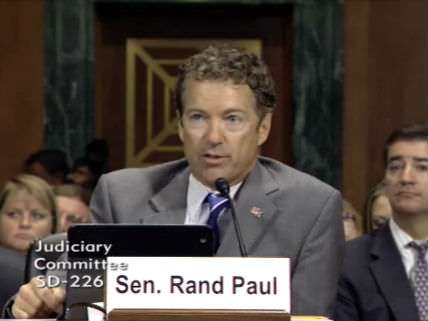Rand Paul: 'I Am Here to Ask That We Begin the End of Mandatory Minimum Sentencing'

Testifying about mandatory minimum sentences before the Senate Judiciary Committee today, Sen. Rand Paul (R-Ky.) emphasized the racially disproportionate impact of the war on drugs:
If I told you that one out of three African-American males is [prohibited] by law from voting, you might think I was talking about Jim Crow, 50 years ago. Yet today a third of African-American males are still prevented from voting because of the war on drugs. The war on drugs has disproportionately affected young black males. The ACLU reports that blacks are four to five times more likely to be convicted for drug possession, although surveys indicate that blacks and whites use drugs at about the same rate. The majority of illegal drug users and dealers nationwide are white, but three-fourths of the people in prison for drug offenses are African American or Latino.
Barack Obama expressed similar concerns before he was elected president. Since then, not so much, although his attorney general recently took up the theme, almost five years into Obama's presidency. More important, Obama has done little to address the injustices caused by the war on drugs, aside from signing the Fair Sentencing Act of 2010. That law, which reduced the irrational sentencing disparity between the smoked and snorted forms of cocaine, had almost unanimous support in Congress, so it's not as if Obama took much of a risk by supporting it. And having declared that thousands of crack offenders are serving excessively long sentences under the old rules, he has used his clemency power to free exactly one of them. Sen. Richard Durbin (D-Ill.) mentioned her at today's hearing: Eugenia Jennings, an Illinois woman who got a 22-year prison sentence for selling "a handful of crack cocaine" to an undercover cop. When Durbin told Obama about her case, the senator said, the president checked with the U.S. attorney's office that prosecuted her and the judge who sentenced her; after both said she did not belong in prison, Obama decided to shorten her sentence by 12 years.
"I'm glad the president has such great compassion," Paul commented, "because he's admitted, like a lot of other individuals who are now elected to office, that at one time he made mistakes as a youth. And I think, 'What a tragedy if he had gone to prison….American would not have gotten to see Barack Obama as a leader.'" It was hard to tell whether Paul was being sarcastic.
Paul mentioned other examples of draconian mandatory minimums, including the 55-year sentence that Weldon Angelos, a 24-year-old Utah music entrepreneur, received for a few small pot sales. Another witness, Brett Tolman, a former U.S. attorney for Utah, noted that the DEA could have busted Angelos after the first undercover buy but waited for two more, knowing that Angelos' possession of a gun would trigger stacked sentences adding up to more than half a century. Paul also cited Edward Clay, an 18-year-old first-time offender who got 10 years after he was caught with less than two ounces of cocaine, and John Horner, a 46-year-old father of three who got a 25-year mandatory minimum for selling some of his painkillers to a friend who turned out to be a police informant. "The injustice of mandatory minimums is impossible to ignore when you hear the stories of the victims," he said. "There is no justice here. It is wrong and needs to change."
Paul said the Justice Safety Valve Act, which he and Patrick Leahy (D-Vt.), chairman of the Senate Judiciary Committee, introduced last March, would restore some of the discretion that mandatory minimums took from judges. "We're not repealing mandatory minimums, although I probably would," he said. "What we're doing is merely allowing a judge to sentence below a mandatory minimum if certain requirements are met." Those requirements, as I explained yesterday, are the sentencing factors listed in Title 18, Section 3553, which include, along with deterrence and public safety, "the nature and circumstances of the offense and the history and characteristics of the defendant" as well as "the need for the sentence imposed to reflect the seriousness of the offense, to promote respect for the law, and to provide just punishment." So while it is true that Paul's bill would not repeal mandatory minimums, it would effectively make them nonmandatory. The conclusion of Paul's testimony left no doubt as to his ultimate goal:
Each case, I think, should be judged on its own merits. Mandatory minimums prevent this from happening. Mandatory minimum sentencing, I think, has done little to address the real problem of drug abuse while also doing a great deal of damage by destroying so many lives. I am here to ask today for you to let judges to start doing their job. I am here to ask that we begin today the end of mandatory minimum sentencing.
In addition to the injustice of mandatory minimums, Paul mentioned their impact on the size of our prison system:
Since mandatory sentencing began, America's prison population has exploded, quadrupled. America now jails a higher percentage of citizens than any other country in the world, at the staggering cost of $80 billion a year.
Paul also noted the lingering costs of a felony conviction, citing a man about his age from Kentucky who grew marijuana in his apartment during college:
Thirty years later, he still can't vote, can't own a gun, and when he looks for work, he must check the box. The box basically says, "I'm a convicted felon, and I guess I'll always be one." He hasn't been arrested or convicted for 30 years, but he can't vote, he doesn't have his Second Amendment rights, and getting a job is nearly impossible for him….
For a nonviolent felony, we need to get away from a lifelong punishment.


Show Comments (193)